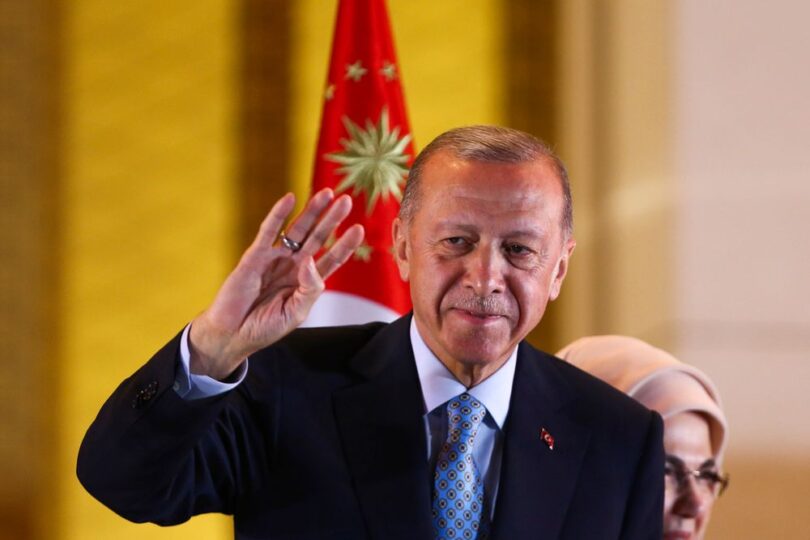Sinem Cengiz
Turkish President Recep Tayyip Erdogan will soon embark on a tour of Gulf states that will include visits to Saudi Arabia, Qatar, and the UAE. Turkiye has a different relationship with each of these countries, sharing economic interests and political concerns.
The first visit is likely to be to the UAE, following last month’s visit by Turkish Finance Minister Mehmet Simsek and Vice President Cevdet Yilmaz. The UAE was the first country they visited after Erdogan formed a new Cabinet. A high-ranking Emirati delegation reciprocated the visit to set the ground for the president’s upcoming trip, which is likely to result in the signing of several deals between Ankara and Abu Dhabi, particularly on investment cooperation. Erdogan’s last trip to the UAE was in February last year, after a rapprochement between two countries.
The focus of the two-day talks between the Turkish and Emirati delegations was on renewable energy, transport, defense and trade. The UAE may be interested in investing in the Istanbul metro project and the high-speed train between Istanbul and Ankara.
In March, Ankara signed an agreement to double its trade volume with the UAE, underlining the growing economic ties between the two countries. After the Turkish elections in May, Turkiye and the UAE ratified afree trade deal signed in March to increase trade between two countries to $40 billion in the next five years. The UAE may invest up to $30 billion in Turkiye, and a target of doubling Turkiye’s exports to the UAE from $5 billion to $10 billion was also set.
The Turkish government has set a goal of attracting $25 billion in investments from Gulf states using methods such as privatization and acquisitions. Transport and Infrastructure Minister Abdulkadir Uraloglu said Turkiye was negotiating with Gulf Arab countries to sell the operating rights for Alsancak Port in the Aegean city of Izmir, in what would be the first major deal in Turkiye’s push for foreign investment under its new economic team. Uraloglu did not disclose any Gulf country that could be a potential buyer.
However, the Gulf states have emerged as potential candidates to fill the investment gap in Turkiye, prompting the president’s visit. It is likely to take place after the NATO summit in Lithuania on July 11-12.Simsek said would bring some investment deals between two countries, without providing further details. Hisvisit to the UAE was described as “productive,” and the topics discussed then will be finalized on Erdogan’s visit.
Simsek’s ministerial appointment was welcomed by the Gulf investors, who considered it a market-friendly move five years after he resigned from a similar role. He has played a key role in devising the implementation of what he’s called “rational” policies and he promises to restore “predictability” to the Turkish economy, which is what the Gulf countries seek. A few weeks before his appointment, I ran intoSimsek in a mall in Qatar and we had a brief chat about his visit. He was on a working trip to Doha, following his visits to Saudi Arabia and the UAE. Simsek has strong business connections in the Gulf countries, which is now helping Turkiye to find a way out of its troubling economic condition.. As a positive outcome, Qatar, the UAE, and Saudi Arabia are providing much-needed foreign currency to the Turkish central bank through swap agreements and direct deposits.
Turkiye considers the Gulf countries key partners in fields such as trade, economics, energy and defense. However, economic stability and trade opportunities are not the sole driving force behind Turkish policy to strengthen its ties: regional security concerns and the diplomatic normalization climate have also pushed Ankara to bring relations back on track.
Despite being on opposite pages for a decade on some regional issues, Turkiye and the Gulf states still share concerns about instability in Syria, Yemen, Libya and Iraq. Although Iran is pursuing a fresh diplomatic outreach to the Gulf countries, marking a new era in regional politics, its proxies still pose threats to Turkish and Gulf interests across the region. Most importantly, the diplomatic normalization climate allowed Turkiye to get rid of its image as the odd man out in the region as it opened the door for re-establishing relations with its former regional foes, in particular Egypt. This week, Ankara and Cairo exchanged ambassadors for the first time in a decade to restore normal diplomatic relations. The move was welcomed by both Saudi Arabia and the UAE as being important for regional stability.
Mutual economic interests and political concerns are likely to strengthen Turkiye’s ties with Gulf countries as it seeks to diversify its economic partners, counter security threats and enhance its position in the region. However, it is not bed of roses, Ankara will have to walk a thin line with diverse actors while pursuing both regional ambitions and domestic economic goals.







